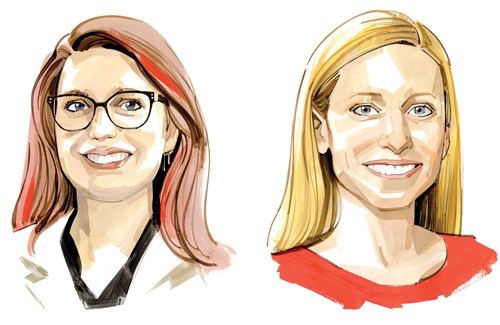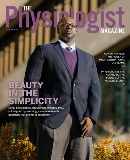University Life
Teaching students and a flexible schedule help make academia rewarding.
 Each issue we ask a student or early-career member to pose their career questions to an established investigator and mentor. Here, Katie Anne Fopiano, a physiology PhD candidate at the Medical College of Georgia at Augusta University, asks Marni Boppart, ScD, FAPS,
about her life in academia. Boppart is professor, College of Applied Health Sciences, at the Beckman Institute for Advanced Science and Technology at the University of Illinois Urbana-Champaign.
Each issue we ask a student or early-career member to pose their career questions to an established investigator and mentor. Here, Katie Anne Fopiano, a physiology PhD candidate at the Medical College of Georgia at Augusta University, asks Marni Boppart, ScD, FAPS,
about her life in academia. Boppart is professor, College of Applied Health Sciences, at the Beckman Institute for Advanced Science and Technology at the University of Illinois Urbana-Champaign.
Q: What experiences outside of science do you feel have best prepared you for academic research?
A: I was fortunate to be commissioned into the U.S. Air Force as an officer and aerospace physiologist right after completing my undergraduate degree. My primary job was to train pilots
and aircrew members about the hazards of flying, which included hypoxia, spatial disorientation, motion sickness, visual illusions, acceleration and g-forces, human factors, circadian rhythm disruption, and fatigue.
Most of the training occurred
in the classroom, which ultimately enhanced my teaching skills. However, we also were expected to fly and participate in simulations (hypobaric and hyperbaric chambers, parachute training), which was physically challenging.
These experiences inspired my lifelong fascination with human physiology, including the molecular and cellular mechanisms that pro-mote human survival and adaptation during stressful conditions.
My current research focuses on probing the mechanistic basis for skeletal muscle growth after exercise, specifically the involvement on non-muscle stem and stromal cells. If we can address this question, perhaps we can improve human performance or develop novel cell-based therapies to rehabilitate muscle after injury and disuse.
Q: Did you always know you wanted to go into the career that you have now? Was there a turning point or defining moment that made you decide?
A: No, I never considered it throughout my training. After completing my PhD
in anatomy and physiology under the supervision of Drs. Roger Fielding (previously at Boston University and now Tufts/USDA Human Nutrition Research Center on Aging) and Laurie Goodyear (Harvard Medical School/Joslin Diabetes Center), my impression of
academia was that it was too challenging. The expectation to write grants, maintain an active research portfolio, and mentor students seemed overwhelming.
I applied and was admitted to medical school after graduation because I thought it would be the easier road to travel. However, I quickly realized that medicine did not leave much room for raising a family or providing the opportunity to think deeply about science. I returned to academia with the attitude that I would just try my best. And I love my career choice. It is so rewarding to make discoveries and train the next generation. I have also had the chance to raise a family and travel extensively due to the flexibility it offers.
Q: Do you have any advice on how to keep a
healthy balance in your life, in and out of work?
A: My family ensures that I keep a healthy balance. My husband and I were fortunate to be able to adopt three children at birth. I work hard during my work hours to get the job done, often
eating lunch over my computer because I know I need to leave the office and get home on time. Well, most of the time! My husband, who is also a professor, and my kids know that I love my job and so they understand. Interestingly, I have found that my
most creative ideas about research occur outside the office. The “work hard, play hard” mentality has worked for me.
Q: What is your biggest motivator to continue in research?
A: To be honest, I think there are
more barriers than motivators to conduct basic science research in the current climate. These barriers include an increase in volume of regulatory requirements (forms, training), unfeasible expectations for publishing, length of time for peer review,
and the high cost of doing business. Add to that the high expectation of administrative work and peer review at higher ranks.
A perfect day for me is one where I can just focus on science, to include reading the literature and thinking deeply about our projects. Pure curiosity about life and the human body is the primary motivator.
Q: What is your favorite aspect of being a scientist?
A: There is an excitement that comes from analyzing the results to a question
that has never been addressed. But scientists also serve as mentors and teachers. It is just as thrilling to watch my graduate students develop into scientists, forming and testing their own questions. And some of my most rewarding days occur just teaching
in a lecture hall, watching students’ light bulbs turn on.
Got a career question you'd like to submit? Email it to tphysmag@physiology.org. We may use it in an upcoming Mentoring Q&A.
The Physiologist Magazine
Read the Latest Issue
Don’t miss out on the latest topics in science and research.
View the Issue Archive
Catch up on all the issues of The Physiologist Magazine.
Contact Us
For questions, comments or to share your story ideas, email us or call 301.634.7314.


